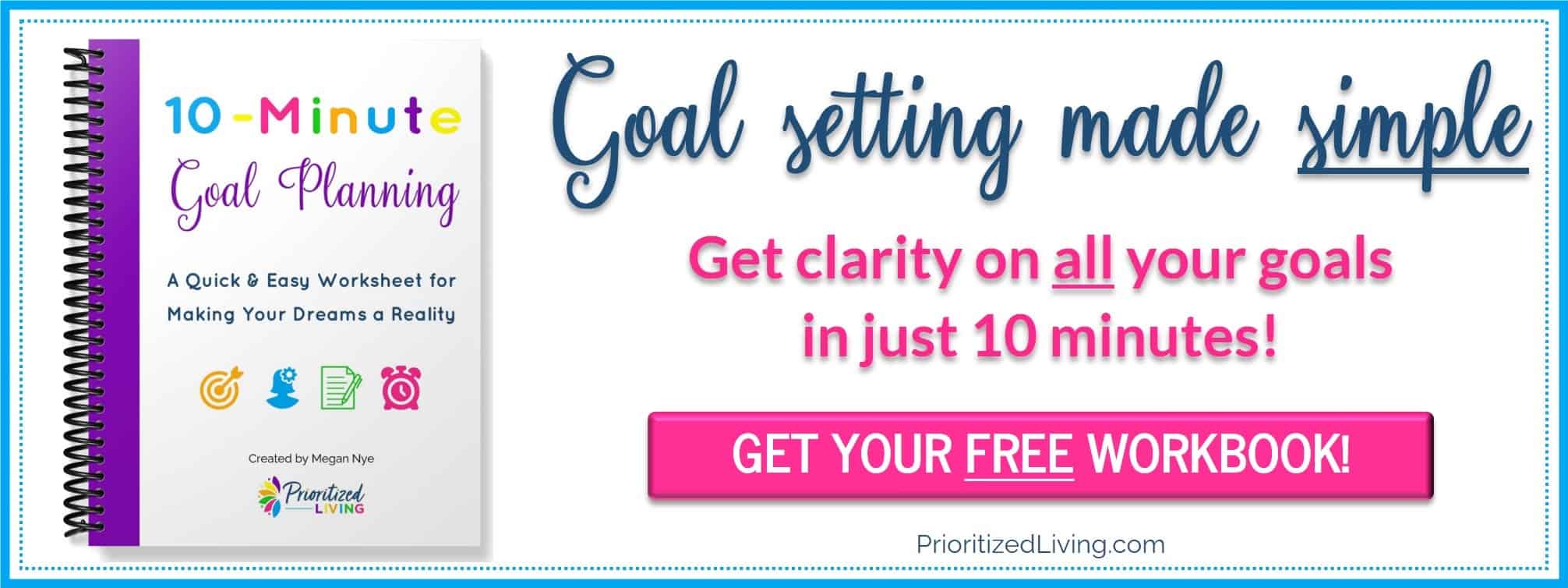You feel completely stuck.
Maybe it’s taking forever to make progress on your big goal, and you’re losing motivation.
Maybe your progress was good until you came screeching to a halt.
Or maybe you’re struggling to take that very first step.
Setting a goal, working toward it, and reaching it can be a definite challenge. And it’s no reflection on your character or strength of will if you find yourself stalled before the finish line.
Sometimes all you need to reach your goals quickly is a change of perspective and some simple tools.
Wondering how to reach your goals faster? Work through these 9 powerful steps.
1. Identify a precise outcome.
The research is conclusive: People who write down their goals are 50% more likely to reach or make serious progress on their goals than people who don’t commit them to writing.
Writing something down not only makes it tangibly real. It also forces you to choose words to describe your goal. No longer is it a vague feeling in your head. You actually have to describe what you mean when you put pen to paper.
Take advantage of that opportunity to create a crystal-clear vision of what reaching your goal means for you. Envision what your life will look like when you achieve that goal.
What’s different overall? Day-to-day? What are you doing in the future that you’re not doing now? Spell it out.
After all, how will you really be able to achieve a goal if you don’t know exactly what your target is?
2. Spell out your “why.”
So you’ve dealt with the “what” of your goals — what you’re trying to accomplish and what that really looks like. And, while that component is essential to achieving your dreams, what’s even more important is the “why.”
Think about it: Your “why” is the reason you’re undertaking this journey toward your goal in the first place. Pursuing a goal is rarely a walk in the park! It takes effort — sometimes a lot of effort to persevere, overcome obstacles, and reach your destination.
So you must have good reasons for choosing the goal you’re chasing. Spell out — again in writing — exactly what those reasons are. What is your motivation? How do you hope to feel in the future compared to now? What will be better in your world?
For instance, maybe you want to declutter so you always find what you need, feel relaxed at home, and say yes when people want to drop in unexpectedly. Or you’re starting a business to follow a passion, really help your target client base, and create flexibility in your schedule.
Brainstorm the reasons you’re working toward this goal. Write it down, and keep that list handy.
3. Create an artificial deadline.
We all have that mental list of fuzzy goals we plan to tackle “someday.” You know that list — the ones you’ll absolutely do . . . just as soon as you “have time.”
It is my sincere hope that someday I’ll look and say, “Wow, I really have some time here. What should I do?” But I can’t remember thinking that since summer vacations when I was a kid!
Face it: We don’t have time to spare. If anything, we’re already overbooked and forced to prioritize some activities over others. And those activities are usually the ones that have an external deadline attached to them — due dates for bills, an upcoming holiday, the start of the school year.
The solution? You need to make time for your own goals. And to do that, you have to give yourself the ticking clock of a looming (internal) deadline.
So, if your goal doesn’t come with a built-in deadline, choose one. Pick a timeframe that’s achievable while not giving you so much time that you lose momentum. Then, treat that goal’s deadline like a real deadline in your mind.
4. Customize someone else’s blueprint.
To get to a destination, you know you need a map — a plan to get you from where you are to where you want to be.
But here’s the thing about goals: You don’t actually have to make your own plan to achieve them.
Whatever your goal is, it’s extremely likely that other people have had that goal before you. And some of them have succeeded in reaching it.
So, they’ve already invested the time and effort in . . .
- discovering the obstacles,
- troubleshooting problems,
- and looking back at what they could have done better.
How invaluable would it be to have that information instead of blazing an unfamiliar path of your own??? There is no trophy for reinventing the wheel.
So find those people! Depending on your goal, maybe they’ve written articles or books on the subject. They’ve made YouTube videos. They teach classes. Maybe it’s even someone you know.
Track down one or more people who have reached the goal you want to achieve, study their plan, and adapt it as needed.
5. Give yourself easy wins.
Psychological studies show that seeing small successes early on gives you the motivation to keep going for the big success.
And early successes are crucial, because that’s when you tend to be most vulnerable. At that point, you’re juuust getting started on your creating new habits — whether that’s saving more money, eating fewer calories, or getting up 30 minutes earlier.
Plus, at the beginning, it’s hardest to see the path. So you’re likely feeling some uncertainty about whether you can really reach your goal.
So it’s essential that you set yourself up to win early on. There are two great ways to do this:
1. Go all-in on your goal for a short period of time.
So you’ll commit to skipping dessert every day for a week. Or throwing out a dozen unwanted items for 10 days.
The point is this: Tell yourself it’s only temporary! This doesn’t have to be the way you live your life every day. And it’s entirely possible that that level of intensity is unsustainable.
But this tiny burst of super commitment early on will almost definitely yield noticeable results. You’ll lose a few pounds, you see a much tidier home, or whatever it may be. And that clearly visible change can give you the morale boost you need to keep going at whatever pace feels best for you.
2. Set daily micro-goals.
When you’re just getting started, make achieving a goal every day stupid easy. Something like, “Today I will do 3 push-ups” or “I’ll put $20 into a savings account.” Completely unintimidating, right?
Choose a micro-goal that inches you slightly closer to your big, scary goal. Write it down. Then do it. You’ll not only get closer to your destination, but you’ll also prove to yourself that you can totally do this!
6. Transform your goal into bite-sized mini-goals.
Staring at a far-off goal can often sap your motivation and confidence. So it’s essential that you create milestones and checkpoints for the journey.
Remember: Micro-goals are an excellent way to build momentum and get you moving along toward your final objective. But they’re invaluable all along the journey as well.
After all, maybe you don’t really know what each step will look like on your path to success. But you can probably identify the first one or two steps pretty easily.
Focus on those. And, once you achieve them, you’ll be in a much better position to see the next stage of the journey.
For instance, maybe you don’t know how to paint your blindingly white dining room. But you can read some articles or watch a few videos on the subject. Then you’ll better be able to choose the tools you need to buy, and so on.
7. Make it hard to give up.
Usually, when you’re working toward a new goal, it’s easy to give up and hard to keep going day after day. And that means you’re always fighting the current toward your objective.
So flip that dynamic on its head as much as possible. Make it hard to give up, even when you want to.
- Put it right in front of you. Remember that “why” list? Post it on the fridge, on your computer, on your bathroom mirror — wherever you will see it staring at you each day.
- Find an accountability partner or group. That might be an in-person meeting, a Facebook group of people chasing the same goal, or a friend who will call you out if you try to rationalize giving up your goal.
- Pay for help. People value what they pay for. So you’re less likely to give up on your diet if you’re paying month after month for a diet plan or a gym membership.
- Get the tools you need to succeed. Set up a donation pick-up and get some empty boxes if you want to declutter your kids’ old toys. It’s harder to find an excuse not to tackle your task if everything you need is set up and ready to go.
8. Choose a super-simple tracking system.
It’s easy to look at where you are and forget just how far you’ve already come.
We get used to the “new normal” really quickly. So it’s deeply important that you keep some kind of log of your progress. That way, you can clearly see where you started, what life used to be like, and what you’ve accomplished since.
What kind of tracking system should you use? The simplest one that works for your lifestyle. Paper and pen, a spreadsheet, an app, a chart you color in — you choose.
The important thing is that it’s easy enough and intuitive enough that you’ll actually use it regularly. And the format of your log will let you track your progress, see yourself getting closer to that goal, and celebrate the accomplishments you’ve already made.
9. Schedule goal-related activities.
For most people, this is true: If you don’t schedule it, it won’t happen.
So, if you want to reach your goal — and you know at least the next step you need to get there — you need to plan exactly when you’ll take that step. Wednesday at lunch? Every Saturday morning? Each evening before you go to bed?
Make an appointment with yourself. Then treat that appointment with the same weight that you would give an appointment with your doctor or a meeting with your manager. Give your goal the respect it deserves on your schedule.
The next time you’re ready to tackle any goal — big or small — take the time to go through these 9 steps. You’ll boost your chances of success and reach your goals faster!
What’s one goal that you’ve been struggling to achieve? What will you do to push toward it?




















Leave a Reply